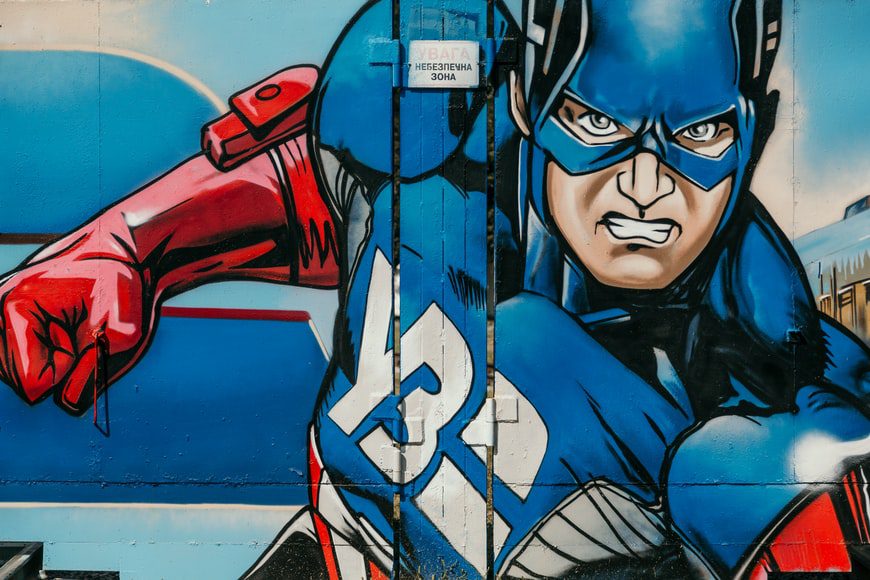Captain America by Marjan Blan, licensed under Unsplash license
A few days back, I asked my dad, “Are there any libertarian superheroes?”
He replied, “Well, that depends on how you perceive them.” His response got me thinking about how the advent of comic culture has resulted in fictional characters being depicted as saviors in abstract forms. They have come to light during times when governmental institutions have failed to emphasize the values of freedom and justice.
Comics which embody core libertarian values have introduced leaders who protect freedom and help prevent the subversion of justice. Most superheroes are depicted as falling somewhere along the liberal spectrum and most publication houses have presented a pro-individual, anti-tyranny message to their audience.
So, the question is, how can one link libertarianism with these worlds of fiction?
Let’s begin with the sentinel of liberty that is Captain America, aka Steve Rogers, of Marvel Comics. This character, first introduced during WWII, later on went to join the Avengers, a private body run by superheroes to save the world and keep government regulation at bay.
In the movie Civil War, after witnessing a significant amount of collateral damage caused by the Avengers in their attempt to aid humanity, the question of liberty vs security arose. The ensuing debate saw Iron Man, aka Tony Stark, endorsing government surveillance while Captain America opposed it. Subsequently, the Avengers, a private organization, underwent a hostile takeover by the Government, thereby becoming subject to strict bureaucratic protocols. Iron Man made the case that embracing tighter regulations constituted a wise move. “We need to be put in check! Whatever form that takes, I’m game. If we can’t accept limitations… we’re no better than the bad guys.”
Captain America responds by raising the question that, if the government is given the power to dictate a private body’s actions, what prevents the government from acting in a misguided way or taking decisions that would harm essential values in the process. Here, Marvel glorifies the idea of liberty and individual accountability through a decentralized framework – cautioning that majority of the government are composed of errant and incompetent people whose intervention would not necessarily not fix the problems at hand but could instead hamper any form of progress. A decentralized system provides a means for people to tread with caution while exercising their individual freedom. They are able to act in their own interests in a reasonable manner. As Nobel laureate Friedrich Hayek said, “A free society will not function or maintain itself unless its members regard it as right that each individual occupy the position that results from his action and accept it as due to his own action.”
Now let’s enter the dark side of the comic universe – DC Comics. Imagine a scenario where every reasonable, possible and imaginable governmental institution has collapsed due to the innate failures which have resulted in the chaotic uprise of crimes. Who protects individuals against others in such a scenario? With people turning violent, all sense of community dying, and the corrupt gaining supremacy – the story of the dark vigilante billionaire Batman of Gotham City begins. This character inherits his late father’s business and wealth, subsequently fighting to stop a mental health system from churning out criminals due to administrative inefficiencies and malevolent government bureaucratic involvements.
Furthermore, Batman, aka Bruce Wayne, demonstrates that private charities, institutions, etc. can function as sound welfare systems and do what government programs could never achieve. It shows how a single private citizen, without being hampered by red tape, is capable of making a difference without any need for coercion, government incentive, or direction. He can be seen as the archetype of a conscious capitalist.
Another superheroine who held strongly to the values of freedom also managed to help revolutionize societal views on the roles of women. Her creator, William Moulton Marston, asserted that, “The only hope for civilization is the greater freedom, development, and equality of women in all fields of human activity.” Wonder Woman, aka Princess Diana of Themyscira, chose to leave her royal affairs behind to aid humankind in transcending a dystopian world wrought by their own disruptive endeavors. She made her own individual choice to assume responsibility for humanity, even though she was alien to our predicaments. She promoted the idea of the rule of law with statements such as the following:
“You know what that means- Liberty and Justice for all regardless of race, color, or religion.”
These heroes were created to fight villains who represent real-world problems. Heroes like Batman, Wonder Woman, and Captain America have been fighting for liberty and justice across a wide range of issues. Comic culture has always provided an opportunity for escapism and finding solace from reality. An important aspect of the philosophy presented by these comics is the emphasis on individual freedom and decentralized systems to provide a better future for others. This is why I find the crossover between liberty and superhero comics/movies particularly fascinating, as I hope you now do as well!
So, here’s hoping for a freer future and more great comics promoting the ideals of liberty!






